|
Recommended Reading I used
to bring in several books to pass around and loan out, but there are too
many students and not enough books. I will recommend those I feel are very
good here. Many are in print and can be found through your local bookstore
or through online retailers. You can also regularly find some of them at
Amazon or eBay, often as very inexpensive used versions. I also recommend
checking local used-book stores such as Pro Libris — mostly because I
love supporting local bookstores, but also because you're likely to find
many of these titles there.
If you don't find them at Pro Libris,
there are many other places to check them out. The Big Chicken Barn in
Ellsworth is a great place — even if they don't have these books, because
the sheer volume makes it a fun place to browse, even if some of the
prices are too high. You're likely to find good deals, though.
I am willing to loan out most of
these books to students during the class run. I DO NOT loan out the first
book on this list, however.
|
 |
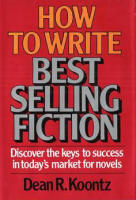 How
to Write Best-Selling Fiction How
to Write Best-Selling Fiction
by Dean Koontz Good luck finding this.
Its starting price on Amazon and eBay tends to run from $50 to $200, and
it routinely sells for the upper end of that range, and as high as $400 when autographed by Koontz. This is, in
my opinion, one of the finest how-to books about writing ever written.
Despite the fact that it was published in 1980, and despite some of its
market-related information being 30+ years outdated, this is still a major
gem. The author, Dean Koontz, was already a national bestselling author
when he wrote this, his second how-to writing book, and he's since gone on
to be nothing short of a master in the world of fiction.
If you see this in a used-book
store, it may well be far cheaper than the online price. If you find it,
if you can afford it, get it. I own a copy and do not ever lend it, for
obvious reasons. I consider this my absolute writer's bible; if I had to
give up every single book on writing that I own except for one — and I
own many great titles — this is, hands down, the one I'd keep.
I first found my copy of this book
in 1991 at Pro Libris in Bangor. It was a few bucks, and not the
sought-after book it is today. I loaned it to my brother, who later found
a copy there. I have not seen any since, but keep looking.
This book was originally published
by Writers Digest Books, which has consistently published fantastic how-to
books (I'd recommend checking any of them out, and many on this page are
WDB titles), so I'm at a loss to understand why they haven't begged Koontz
to update this book and re-release it.
|
 |
 The Elements of Style
by William Strunk Jr. and E.B. White
There are more books about the
mechanics, form, and style of the English language than you can possibly
imagine. If you have to choose just one, make it this one.
While there are a select few
out-of-date things in this volume (with its roots tracing back to before
1920), it's mostly right on the mark. It has also been updated many times
over the years, and the current edition likely has a different cover and
has been updated further.
The Elements of Style is as
close to a definitive source of English usage as there is, and all in not
many pages. Use Strunk & White as your starting point.
|
 |
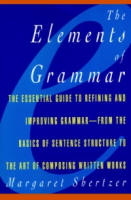 The
Elements of Grammar The
Elements of Grammar
by Margaret Shertzer Once you have The Elements of Style in hand, get The Elements of Grammar. This breaks down
everything you need to know about English grammar beautifully in one slim
volume — bigger than Strunk & White, but not gigantic. This is a great
resource, and one I actually use more often than Strunk & White — mostly
because (knock on wood) I have pretty much all of Strunk & White down to a
science. And although I think my grammatical skills are very good, I still
find myself questioning something and looking it up. Shertzer's book is
where I head.
Another
good "Elements" book is The Elements of Editing, which
has recently been updated. It's geared towards professional editors and
journalists, and although my old 1988 copy is out of date, it's pretty
good if you want to learn a bit about the world of hard editing.
|
 |
 The
20 Master Plots and How to Build Them The
20 Master Plots and How to Build Them
by Ronald B. Tobias There have been many books about plot
over the years. I seem to recall books claiming there are only 32 plots, a
dozen plots, six plots, or even just two plots — all of them claiming
that every plot falls into one of those categories. Tobias, in my opinion,
has the smoothest book about plot ever written. He breaks down those 20
plots with a chapter on each, replete with examples, and no two plots are
enough alike that they seem duplicative. Of course, a plot might be
characterized as fitting more than one of the 20 master plots. Another
great book to read over and over again.
This is published by Writers Digest
Books. |
 |
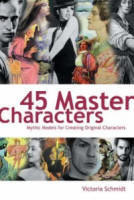 The
45 Master Characters: Mythic Models for Creating Original Characters The
45 Master Characters: Mythic Models for Creating Original Characters
by Victoria Schmidt Like plot, there are scads of character
books out there, and many have merit. I really like this one, because I
like the examples Schmidt provides that helps bring her 45 archetypes to
life. These archetypes, both male and female (since archetypes are often
gender-based), are general models that work no matter your culture, based
on ages-old mythological archetypes common across all cultures. This is a
great resource for when you're trying to create vivid, three-dimensional
characters and need a little inspiration. I read through this one every
now again to refresh my mind. The book is great not just for short stories
and novels but film and TV writing as well. Schmidt even includes
worksheets to help us map characters, which I don't personally use but
others may find helpful. (I tend to type notes in a text file and keep it
in the same folder as the story I'm working on; same result.)
This is published by Writers Digest
Books. |
 |
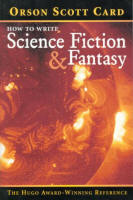 How to Write Science Fiction &
Fantasy
by Orson Scott Card
Orson Scott Card knows science
fiction and fantasy, and he shows it in this book, which is so good it won
a Hugo Award. If your focus is either of these genres of fiction, Card
breaks it down nicely.
It's worth noting that Koontz's book
above has a chapter specifically about writing sci-fi, and it's pretty
fantastic in and of itself.
This is published by Writers Digest
Books. I know, it looks like they pay me off for recommending them,
doesn't it? They don't; they just publish fantastic stuff, and many of
their titles are in my "reread it regularly" library. |
 |
 How to Write Mysteries
by Shannon Ocork
I admit I have never read a book by
Shannon Ocork, and in fact had never heard of her before I stumbled upon
this book. Furthermore, I don't write mysteries, per se, so had little use
for such a book — or so I thought. The fact is, even if you don't have a
detective story or a typical whodunit, that doesn't mean that what you
write won't have a mystery embedded in it somewhere. Even if you think
your writing won't ever need to include a mystery, I recommend reading
this anyway. It was quite an eye-opener, and I learned a lot and have
applied much of the author's wisdom to my writing.
This is also a Writers Digest Book
title. Honestly, they don't pay me. |
 |
 Writing Down the Bones: Freeing the
Writer Within
by Natalie Goldberg
There may be no book better than
this for kick-starting the lazy or stumped writer within you. The entire
book is comprised of brief essays, mostly two to three pages, that will
get your writing motor running. Goldberg is an incredible inspiration, a
woman who not only writes, but has devoted her life to becoming the
consummate writer who always writes, all the time, whenever she can, about
anything and everything. For anyone who has ever had writer's block and
not known how to beat it, who has ever put off writing because he just
wasn't in the mood, or who has ever wondered about how serious he is about
writing, this book is a must-read.
For some inexplicable reason, I have
seen this book a lot at Pro Libris. Nobody should ever be getting rid of
this book, but if they do, it will only benefit people who haven't read
it.
This one is NOT a Writers Digest
Books title! The copy I have is an older edition, but I see it has been
updated in 2010.
Goldberg
has written several other books, all worth reading, most
notably Wild Mind: Living the Writer's Life. |
 |
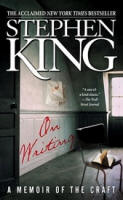 On Writing: A Memoir of the Craft
by Stephen King
This is an interesting book in that
it's part how-to book and part King memoir. In fact, King subtitles it "A
Memoir of the Craft," but much of the book is somewhat autobiographical.
If you're not into Stephen King, much of this might not interest you. The
trade-off is that he intertwines the autobiographical stuff with the
how-to stuff, using his own experiences as a writer from his childhood
through adulthood as vehicles to convey the craft he has so expertly
mastered.
Even if you aren't a fan of King or
horror in general, if you want to write fiction he should be on your very
short list of writers to read. Few writers create such intricate,
believable characters as Stephen King, and fewer still can craft
masterpieces of storytelling like this guy. Read anything by him and learn
how a master does it.
This is still in print, as all King
books are (a testament to his skill and appeal), and you can easily find
used copies at Pro Libris. It's published by Scribner. |
 |
|